A little while ago I was contacted by the company promoting Bellamy Hunt’s new book, Film Camera Zen, asking me if I would like to take a look at a copy for the benefit of some sort of review. These are moments I must admit I do enjoy running this website – I’d been intending to pick up a copy to read and probably write about anyway, so I quite happily agreed.
I had/have a few motivations for wanting to write this review. The first is that whilst I wouldn’t say me and Bellamy are BFFs, we do keep in touch and I have a good bit of time for the guy. His website, Japan Camera Hunter, also inspired parts of this one in the early days, not to mention the fact that I’ve bought a few bits of kit through his service over the years too. So whilst I don’t necessarily feel like I owe Bellamy anything, I’m more than happy to support him and his endeavours – this book being one of them!
Conceptually, this is also a book I like the idea of. I have long felt that there are a few cameras that phrases such as ‘cult classic’ do a disservice to. There are, of course, a lot of film cameras that have become overhyped over the last decade-and-a-bit. But, there was a world before the film resurgence and the social media hype, and actually a lot of the cameras that have been overhyped were already cameras that were very widely considered to be some the best.
Of course, “best” is subjective. I myself have tried a lot of cameras – many featured in this book – and the more I have tried over the years, the more my long-standing gut feeling that there is no one best camera – even for me – becomes a very firm position I hold on the subject. I’m sure this is not a surprise to a lot of people reading this either – in fact, it’s pretty much a proven fact on the basis that so many of the damned things exist with so many subtle variations of features all vying to attract potential users’ eye. As a product of this position though, I have found myself fascinated in what cameras are my “bests”, and also where the consensus sits on the subject.
I’m also interested in the idea of camera zen. I see this as the idea of finding a best or series of best cameras, but moreover that those cameras become part of one’s individual access to creative flow. Creative flow seems to be something of a buzz phrase at the moment, but anyone who has experienced it in the context of a camera/photographic experience will know what I’m taking about. It’s that feeling where the camera just feels like an extension of you, where you no longer have to think about how it works, and you can just shoot completely comfortably, lost in the process and moment. It’s definitely something to aspire to I think.
Of course, finding your zen camera can be quite a daunting task. There is admittedly a school of thought that says fundamentally all cameras are just light tight boxes with shutters in and getting used to, practicing with, and eventually mastering any half decent camera – regardless of make, model or what anyone else might think of it – is a perfectly viable course of action. I’d agree too, to an extent at least. Personally though, I tend to take the view that there’s a balance to be found between that perspective, picking the right camera for the task at hand, and indeed picking a camera that inspires the individual photographer through the way it works, feels in the hand, or even the way it makes the photographer feel to own (as long as they are self aware enough to admit that to themselves at least…).
Furthermore, I just don’t see any real harm in having cameras as a hobby that sits alongside photography as a hobby, and from my personal experiences over the years can definitely say that when I have bought a camera that I have had serious GAS for, and then found I am able to master its function and readily access a feeling of creative flow with, well then I really feel like I’m onto a winner.
But as I say, all this can be quite daunting and overwhelming, especially to someone entering film photography with little or no experience or knowledge of the camera options that are out there. The internet is great of course, sites like 35mmc and indeed Bellamy’s own site have vast swathes of information to dive into, but without a baseline of knowledge, where should someone even start? Well, perhaps the answer to that question is a book like Bellamy’s Film Camera Zen.
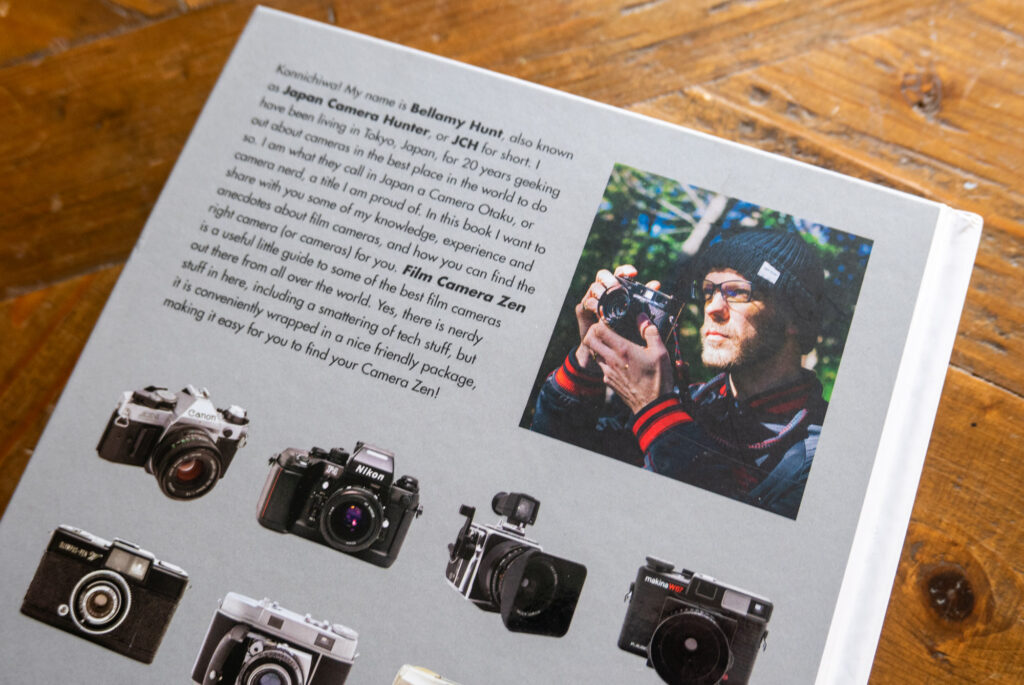
Film Camera Zen – an outline
Ok, so what can actually be found within the pages of this book? It’s very simple actually, it’s quite literally a guide to some of the most popular, most interesting and most successful film cameras released (but from a few exceptions) in the second half of the 20th century. The cameras are presented in alphabetical orders by brand name, and are seemingly the cameras that Bellamy either personally rates as the best, or is aware that have a strong and important following in the community.
Most of the double page spreads feature a single camera with a relatively concise chunk of information about said camera. Each page also has a little guide to how much experience is required and how expensive each camera is. In some cases, two very similar cameras from the same manufacturer are included in one spread, the Contax T2 and T3 for example.
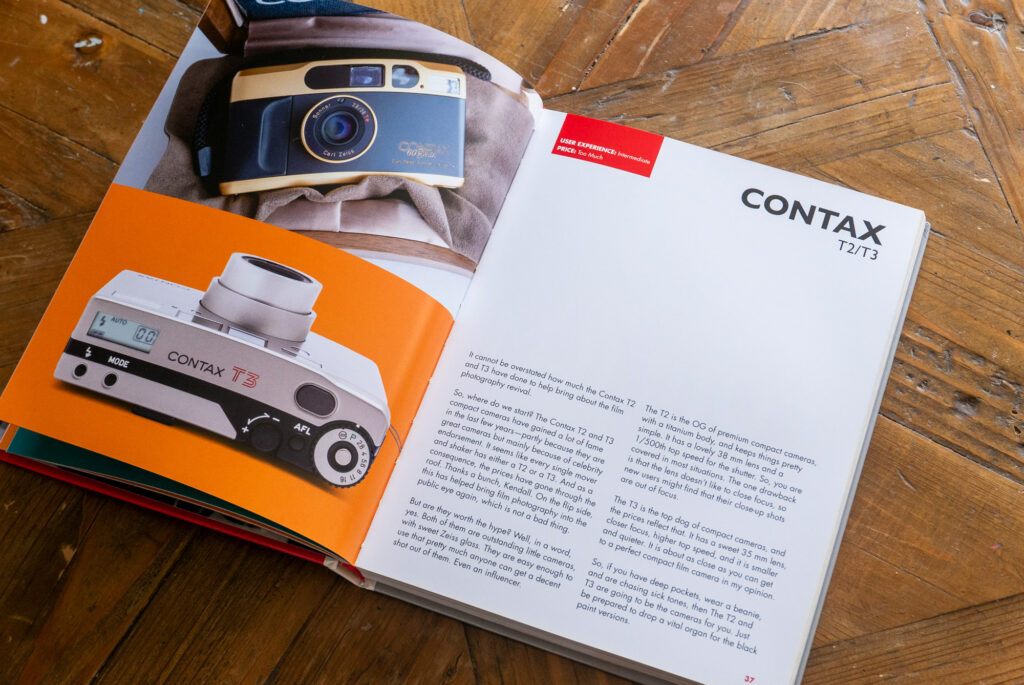

On some of the more significant manufacturers, there are also pages dedicated to giving a bit of background detail to the brand too. All this is sandwiched by and intro and useful contents page at the beginning, and some thoughts about film choice, development and scanning at the end. There is finally a brief section advertising Bellamy’s service as someone who can give you tours of the camera shops of Tokyo.
My book review
I must admit, I probably did expect there to be more in the book around the more philosophical ideas of film camera zen. Then reading it, I realised that this would probably have made for a very different book with a very different purpose. To begin with, trying to work out what camera might bring a feeling of zen to yourself is hard enough, so of course, trying to lead someone else to that feeling through some deep and thought provoking tome on the subject would quite likely be even more difficult and possibly involve quite a lot of navel gazing and waffle. I’d probably quite enjoy that book, but for most people there’s probably much less need to over-intellectualise any of this, and much more need for a more simple guide to some of the bigger camera makes and models from the height of era of film photography.
Bellamy, thankfully, went for the latter approach, and for the sake of the target audience, I’m actually very glad of that. This book is not about wisdom, it’s about his extensive knowledge. And for the aforementioned potentially overwhelmed audience who I perceive this book to be aimed at, I think that’s a good thing! The last thing that audience needs is someone gatekeeping and talking down to them.
In fact, I would say that this book is really very accessible, and whilst there’s a lot of information about a lot of cameras, none of it is presented in unnecessary depth. In fact, what it does provide is just enough background information combined with a few well chosen specifics on each featured camera to lead the reader down a road of further research on cameras they might find themselves interested in. It’s geeky for sure, but not so geeky that it gets into detail that the majority of the people who are likely to pick up this book just wouldn’t need to know.
Knowing Bellamy to the extent I do, it was also really nice to find that it’s written very much in his tone of voice. That tone of voice has been a constant in Bellamy’s writing on his website for many years, so had the book been over-edited by some sort of overbearing 3rd party publisher or whatever, it would have felt weird to read I think.
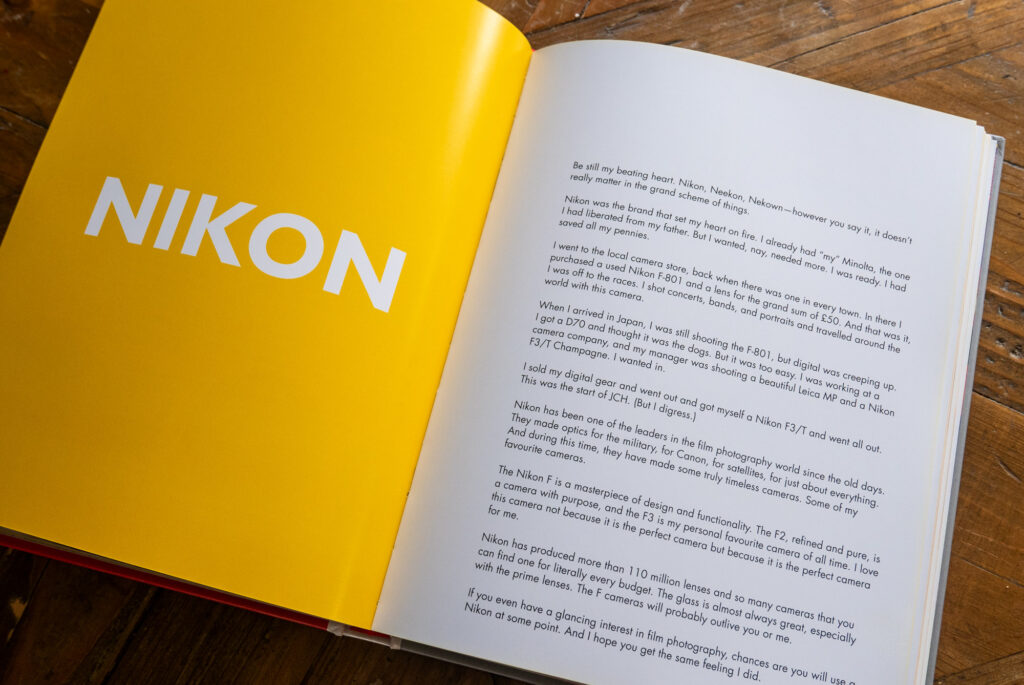
Not just for the beginner
Having reread my words so far, it occurs to me that I have actually done this book something of a disservice. I have read it as me, and I sometimes forget that I already have quite a lot of background info about camera makes and models rattling around my head. I don’t say this to brag, like Bellamy, I’ve been running a website that has a not insignificant focus on film cameras for quite some years now. I also ran a couple of other websites before that, and before that I worked selling cameras, and before that was fascinated with them dating back to my youth in the early 90s. I have shot, or at very least handled the very large majority of cameras spoken about in this book. Whilst this probably makes me less part of the intended audience, the reality is, there is a lot of info about a lot of cameras in here, and unless your already a massive camera geek, there’s probably a lot to be learned flicking through its pages. And actually, despite my background, I still found it very interesting, still picked up a few nuggets of previously unknown information, and still very much enjoyed flicking through it!
The cynical bit
Of course, I can’t let him off with a perfect review – there is something about Film Camera Zen that did jar slightly, and that’s the fact that it does just a touch feel like a brochure for Bellamy’s services as someone who can – for a fee of course – find you your potential zen film camera. This vibe was just slightly emphasised by the little promotional bit at the end for his camera shop tours that is literally an advert for one of Bellamy’s services. I’m also not entirely convinced that the pages around film choice, development and scanning add much to the book – frankly, I think I’d just have preferred more cameras! But, whatever – those pages cause no harm, and well, I can let the guy off promoting his services in his own damned book I think! I know from conversations he had between myself and a few others in a little group chat I’m a part of that he put a lot of bloody effort into this book, so really why shouldn’t he take the opportunity to promote what he does in it?!
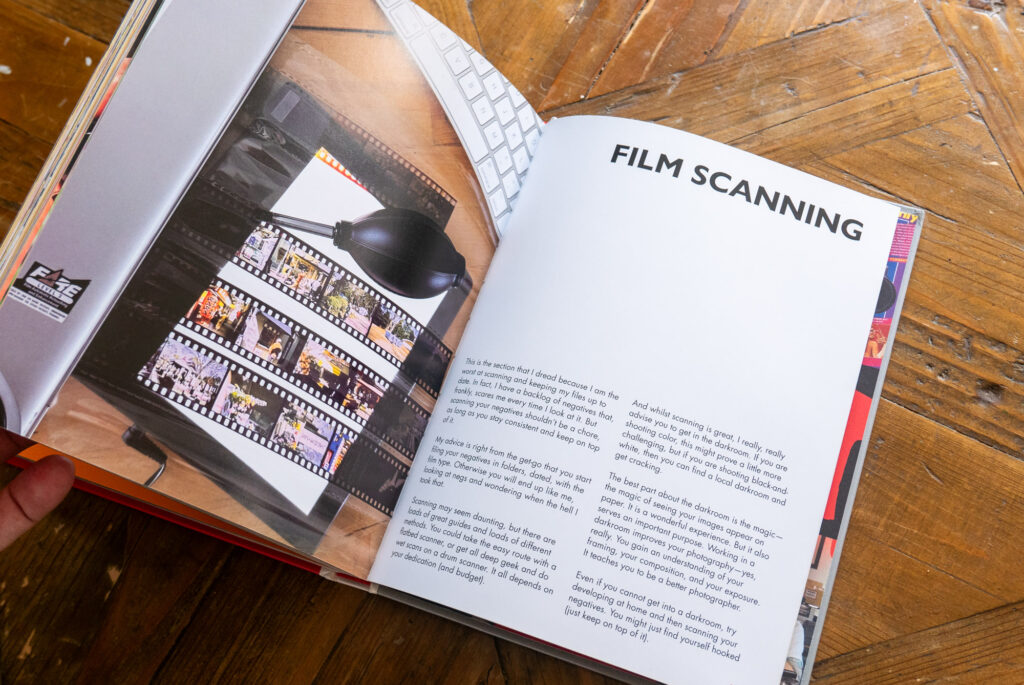
Final thoughts
Film Camera Zen is not the deep dive into the philosophy of camera choice I thought it might be. As I have said, I think I personally would quite enjoy that sort of book. I think Bellamy would probably do a pretty good job of writing that book too. But he didn’t. Instead, what he has written is very much more the guide to some of the most GAS inducing film cameras of (largely) the second half of the 20th century. It is a guide to some of the most interesting, some of the more unusual, but more than anything else some of the most popular and successful film cameras of the era. To my mind it makes a great entry point for anyone looking to get into film cameras and photography as a hobby who might not know where to start. It’s also an interesting and potentially informative book to folks with a little bit more experience under their belts. As I’ve said, it’s also written in Bellamy’s style which I find makes for an interesting read that doesn’t condescend, but simply sets out to inform in a way that’s accessible and easy to read. I enjoyed it, and if you read this website, and or have film cameras as a hobby, you probably will too!
Edit, with permission to share from Bellamy, here is the TOC – thanks to Gary Smith for emailing me this:
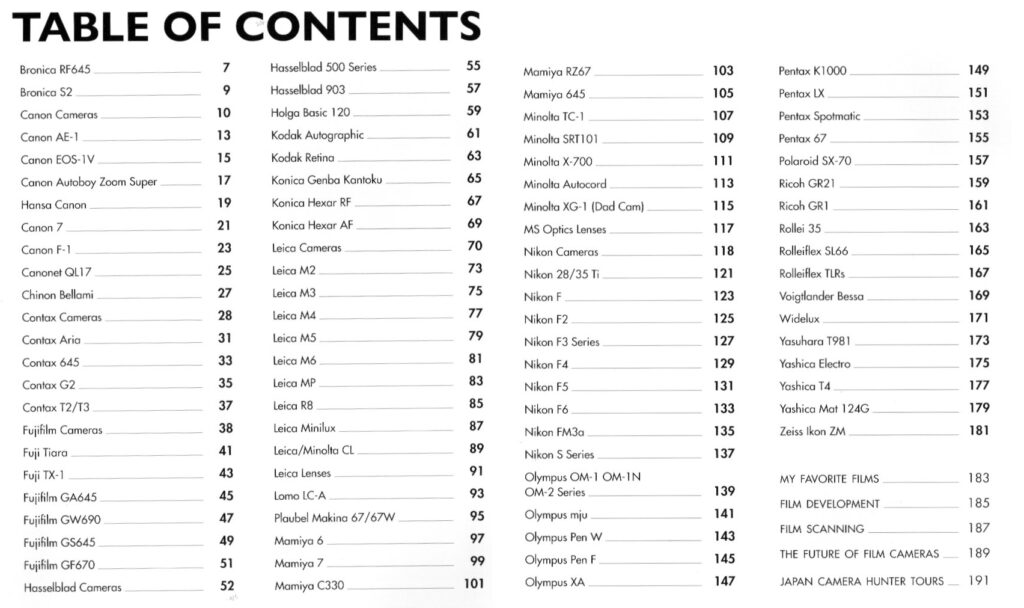
Share this post:
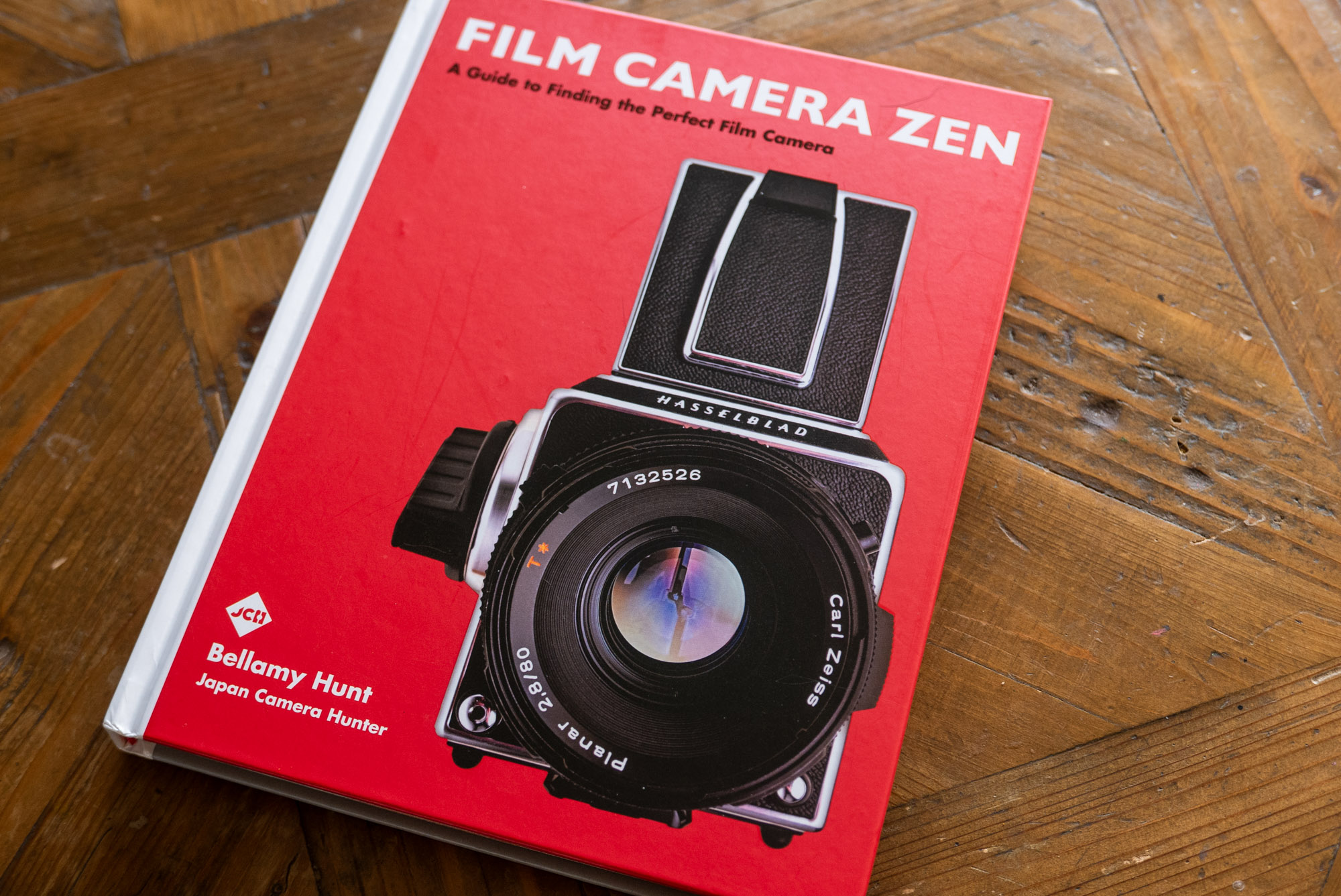
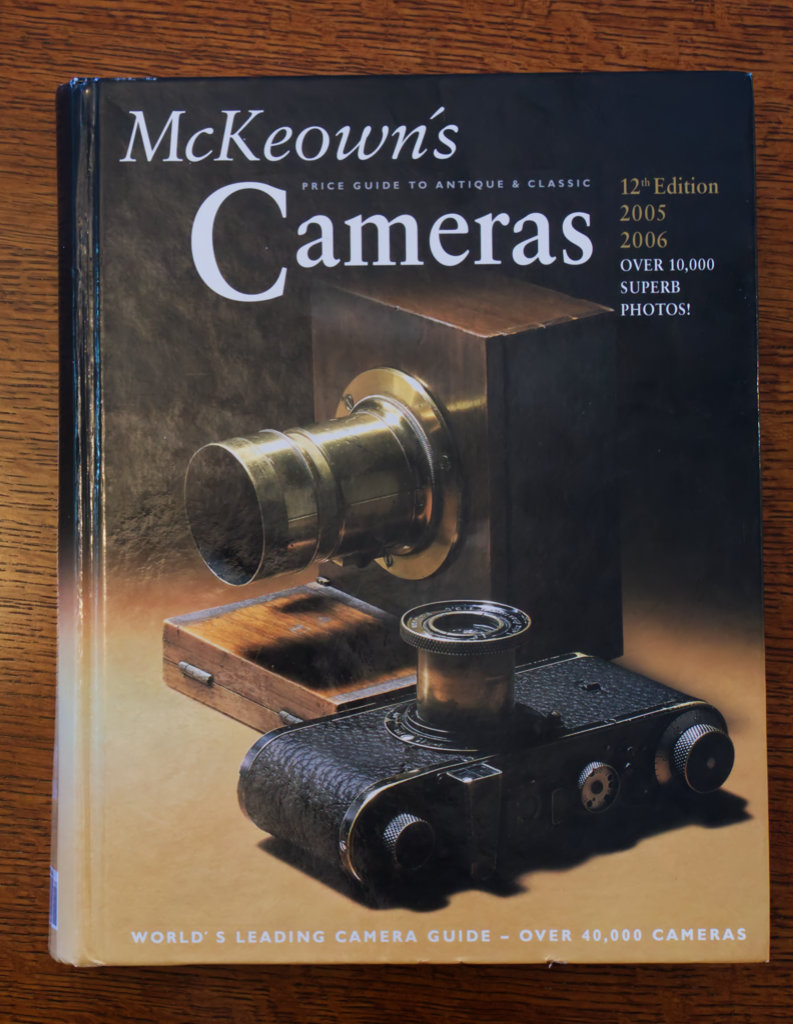
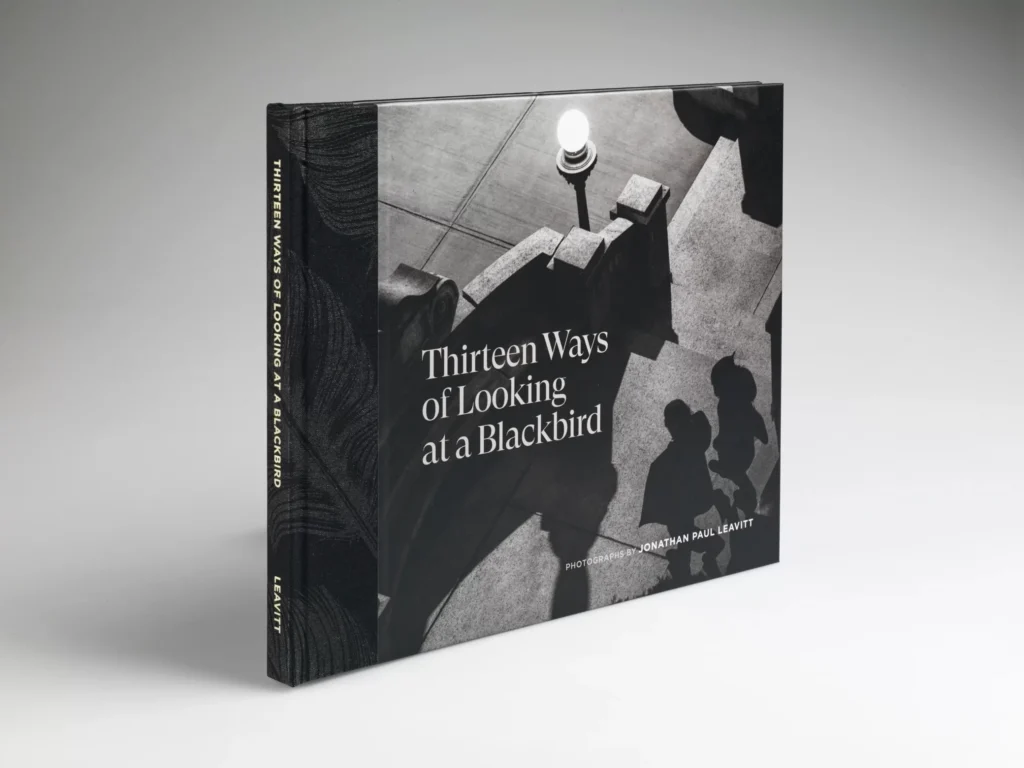
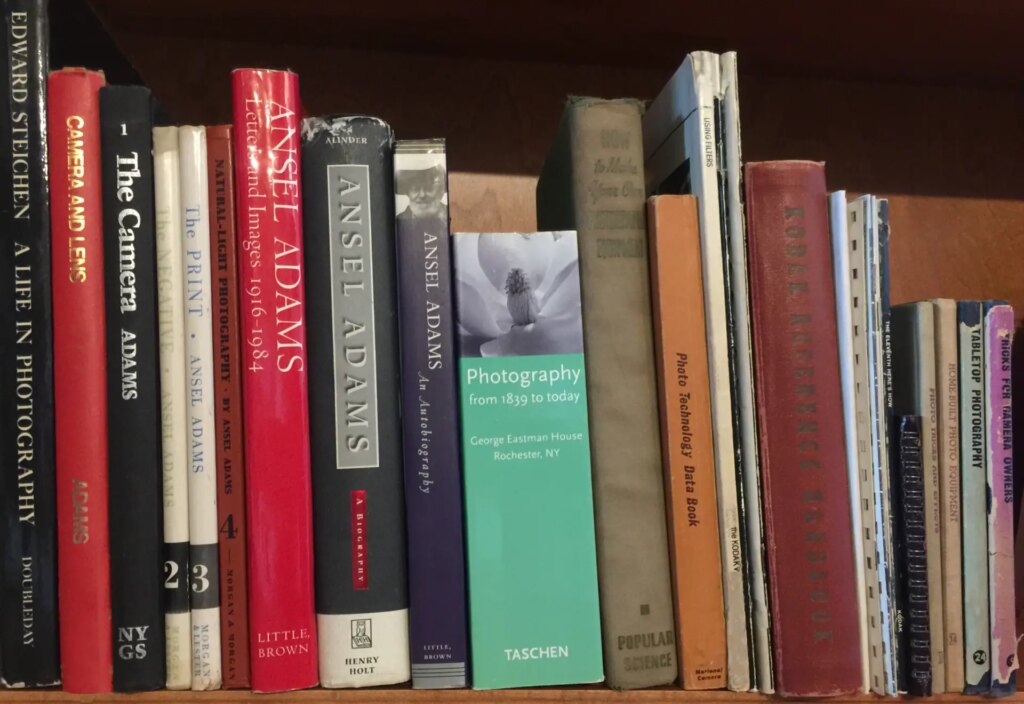
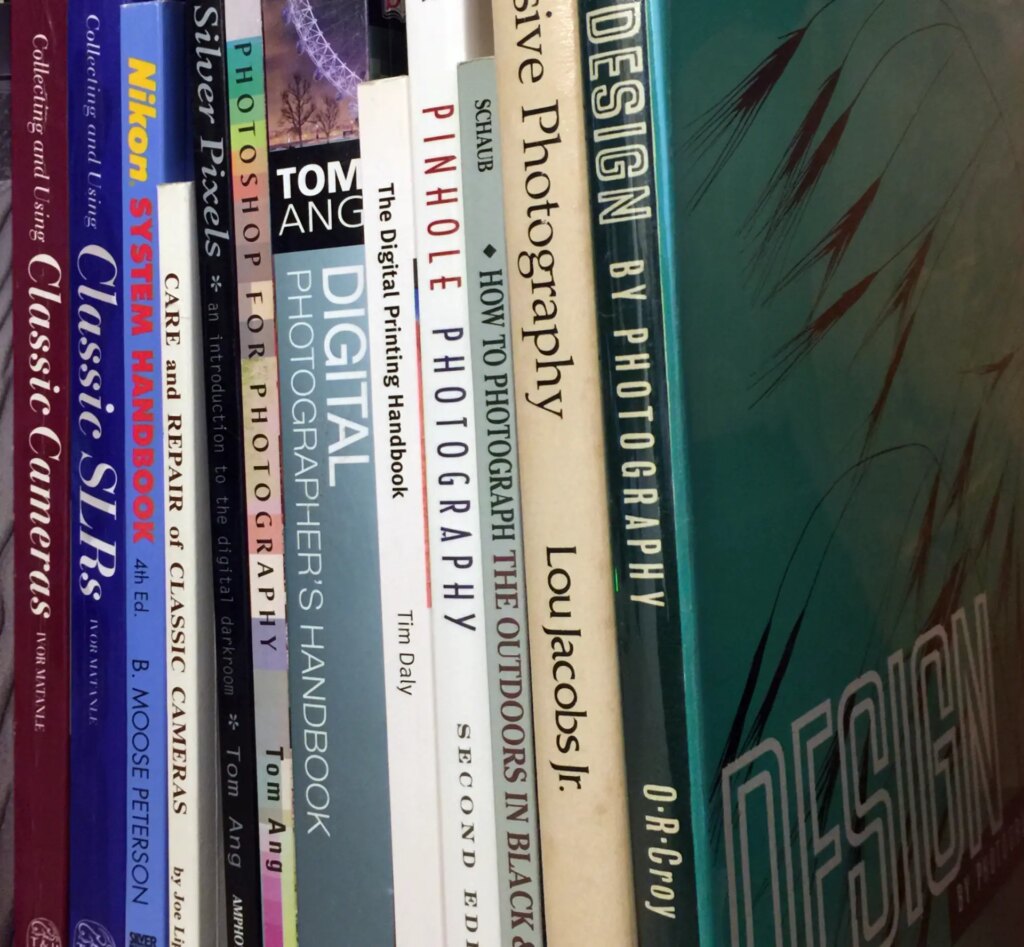




Comments
Matthew Bigwood on Film Camera Zen – Book Review
Comment posted: 03/03/2025
Geoff Chaplin on Film Camera Zen – Book Review
Comment posted: 03/03/2025
davesurrey on Film Camera Zen – Book Review
Comment posted: 03/03/2025
The ones I’ve found most helpful include:
Film Gear by Christof Bircher.
Retro Cameras by John Wade.
Collector’s Guide to Classic Cameras by John Wade
Japanese 35mm SLR Cameras by Bill Hansen
Collecting & Using Classic Cameras by Ivor Matanle.
Collecting and Using SLRs also by Ivor Matanle.
Jason Schneider on Camera Collecting
Although by being quite old the last 3 don’t cover many late 20th century models.
And I must mention McKeown’s “Cameras” 12 edn… the bible.
What they all have in common (except McKeown) is that they are personal selections by the authors in a vast available market.
I had a quick look on Amazon to see inside and I found the JCH book rather lacking in the descriptions. For example compare it with Christof Bircher’s book. But that’s just my opinion.
Comment posted: 03/03/2025
John Bennett on Film Camera Zen – Book Review
Comment posted: 03/03/2025
Gary Smith on Film Camera Zen – Book Review
Comment posted: 03/03/2025
I should know tomorrow...
Hopefully it won't trigger G.A.S.
Comment posted: 03/03/2025
Comment posted: 03/03/2025
David Dutchison on Film Camera Zen – Book Review
Comment posted: 03/03/2025
Comment posted: 03/03/2025
Comment posted: 03/03/2025
Art Meripol on Film Camera Zen – Book Review
Comment posted: 03/03/2025
Richard Arbib on Film Camera Zen – Book Review
Comment posted: 03/03/2025
Comment posted: 03/03/2025
Comment posted: 03/03/2025
Comment posted: 03/03/2025
Comment posted: 03/03/2025
Comment posted: 03/03/2025
Comment posted: 03/03/2025
Gary Smith on Film Camera Zen – Book Review
Comment posted: 04/03/2025
https://realphotographersforum.com/threads/film-camera-zen-by-bellamy-hunt.26907/
Comment posted: 04/03/2025
Comment posted: 04/03/2025
Comment posted: 04/03/2025
Comment posted: 04/03/2025
Richard Arbib on Film Camera Zen – Book Review
Comment posted: 05/03/2025
Comment posted: 05/03/2025
Comment posted: 05/03/2025
Hamish Gill on Film Camera Zen – Book Review
Comment posted: 05/03/2025
Comment posted: 05/03/2025
JC on Film Camera Zen – Book Review
Comment posted: 06/03/2025
Comment posted: 06/03/2025
Michael Keppler on Film Camera Zen – Book Review
Comment posted: 07/03/2025